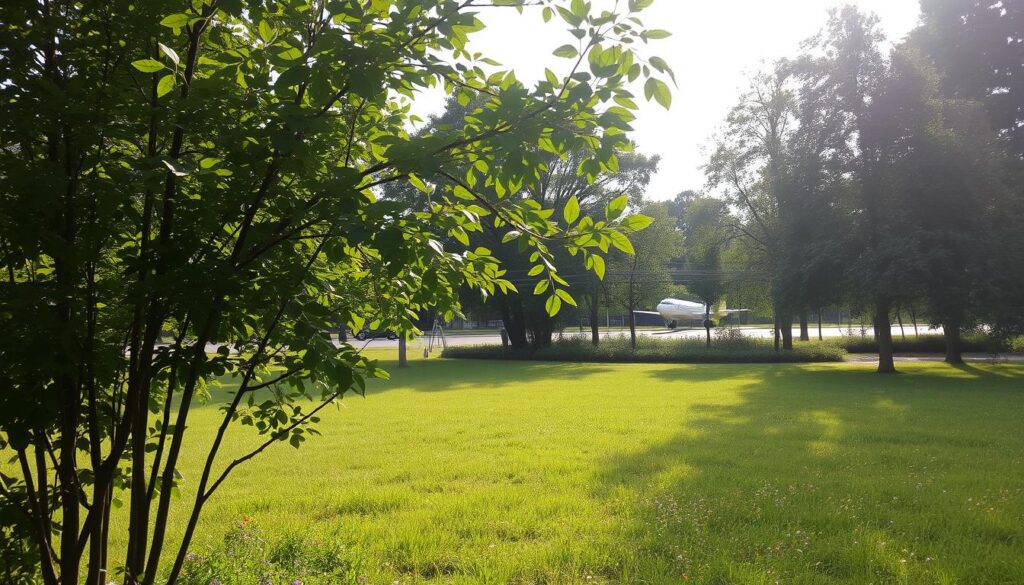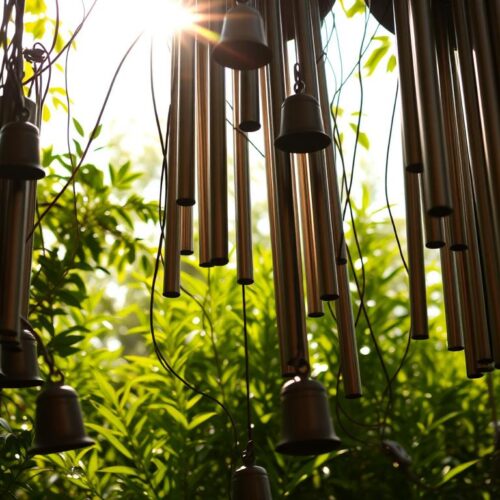Living near an airport can be tough for families. The sound of airplanes can interrupt your baby’s sleep. Getting good sleep is critical for your baby’s growth. This guide will show you how to keep your baby’s sleep peaceful, despite the noise.
We will look into how airplane noise affects your baby’s sleep. And we’ll share tips to make their sleeping space calm.
Understanding Airplane Noise and Its Impact on Sleep
Airplane noise is a big problem for people living near airports. It really affects how well they sleep. The loud sounds from airplanes can disturb how long and how well they sleep. This is very true for babies, as they need constant sleep for their growth.
The noise from airplanes taking off and landing can get inside houses. This makes it important to know how to keep your house quiet. Steps like installing double-pane windows, hanging thick curtains, and adding more insulation can help block out the noise.
Finding out the airplane noise schedule in your area can make a huge difference. You can use soundproofing methods that work best for those noisy times. This way, the sleep of those who are easily woken up, like babies, is protected better. Using these methods can really help make your home more peaceful.
Let’s look at how loud it gets at different times of the day, and some soundproofing ideas:
| Time of Day | Average Decibel Level (dB) | Recommended Soundproofing Tips |
|---|---|---|
| Morning | 70 dB | Install heavy drapes |
| Afternoon | 75 dB | Use weather-stripping on doors and windows |
| Night | 65 dB | Apply acoustic sealant around window frames |
The Importance of Sleep for Infants
Understanding infant sleep importance is key to raising a healthy, happy child. Sleep is not just rest time; it’s essential for your baby’s growth. It is during sleep that vital development happens, including cognitive, emotional, and physical growth.
While sleeping, an infant’s brain processes and stores new information. This leads to better memory and helps babies reach new milestones. Plus, enough sleep keeps babies less cranky and more ready to engage with the world.
A review by the American Academy of Pediatrics shows sleep’s huge role in development. Good sleep leads to better language skills and problem-solving. It also keeps babies healthier by protecting against sickness, proving sleep’s importance.
Creating a quiet, calm sleep setting is crucial. A consistent bedtime routine supports healthy growth and happiness down the road. By understanding sleep’s importance, you can make smart choices for your infant’s health.
| Aspect | Developmental Benefits |
|---|---|
| Cognitive Functioning | Enhanced memory and learning capabilities |
| Emotional Stability | Reduced irritability and improved mood |
| Physical Growth | Stronger immune system and overall health |
Recognizing the Effects of Noise on Babies
Noise can deeply affect babies, especially their sleep. Loud sounds like airplane noise can cause your baby to wake up often. This can make it hard for them to fall asleep again.
To help your baby sleep better, it’s important to understand how noise affects them. Studies show that constant noise can make babies feel stressed. This can be bad for their health and growth.
Loud noises can also slow down your baby’s learning and talking skills. To help your child grow healthy, try to keep their sleeping area quiet.
- Increased Wakefulness: Noise can cause your baby to wake up more frequently during the night, leading to fragmented sleep.
- Heightened Stress Levels: Constant noise disrupts the natural sleep patterns, creating stress for the baby.
- Developmental Delays: Consistent sleep disruption can impact cognitive and language development over time.
- Reduced Deep Sleep: Deep sleep is crucial for growth and brain development, and noise pollution can interfere with this essential sleep phase.
- Health Issues: Long-term exposure to loud noise can lead to various health issues due to poor sleep quality and increased stress.
Practical Tips for Noise Reduction
To make your home quieter, it’s smart to use soundproofing and noise cutting strategies. Here’s what you can do to keep the noise outside:
- Seal Windows and Doors: Make sure windows and doors don’t let noise in. Using weatherstripping and door sweeps helps a lot.
- Install Acoustic Panels: These panels soak up sound and make baby’s room quieter. They work well and are easy to use.
- Use Heavy Curtains: Thick curtains made of heavy fabric can block a lot of noise from outside. This makes your house calmer.

Also, finding soundproofing tips that meet your specific needs can really help lower noise. By mixing these ideas, your baby can sleep soundly, even when it’s loud outside.
Creating a Sleep-Friendly Environment
Crafting a sleep-friendly nursery is key when you live near a busy airport. To ensure your baby’s comfort, look into noise reduction methods. Heavy curtains or soundproof windows can cut down outside noise, giving your baby a peaceful place to sleep.
A white noise machine also helps by making a steady sound that hides sudden ones. This keeps your baby from waking up too often. The aim is to keep your baby comfy during sleep times.
Creativing a calming nursery is more than just controlling noise. Choose soothing colors and gentle lights for a relaxing vibe. Add plush rugs and soft items to soak up sounds, making the nursery even more sleep-friendly.
For help picking out soundproofing items, look at this comparison:
| Product | Benefits |
|---|---|
| Soundproof Curtains | Reduces outdoor noise, adds room darkness, and provides insulation |
| White Noise Machine | Maintains a consistent sound environment, masks sudden noises |
| Soundproof Windows | Minimizes external sounds, enhances thermal insulation |
Using these methods together will make a quiet, cozy spot for your child. This effort lets your baby sleep well, even with airplane noise close by. Remember, setting up a sleep-friendly nursery isn’t just about cutting down noise. It’s also about making sure your baby is comfortable.
Scheduling Sleeping Hours Strategically
It’s really important to keep your baby’s sleep schedule steady, especially if you live near a lot of airplane noise. The trick is to time their naps and night rest during the quieter times of the day. This can help lessen the noise from planes that might disturb their sleep.
Try to set your baby’s sleep times when there are fewer flights. Early mornings and late evenings are usually quieter around airports. You can also use white noise machines or lullabies. These sounds help block out plane noise, making it easier for your baby to sleep.
Here’s a quick guide to find the best times for sleep:
| Time of Day | Flight Activity Level | Optimal for Sleep? |
|---|---|---|
| Early Morning (5:00 AM – 7:00 AM) | Low | Yes |
| Late Morning (7:00 AM – 10:00 AM) | High | No |
| Afternoon (2:00 PM – 4:00 PM) | Moderate | Possibly |
| Evening (7:00 PM – 9:00 PM) | Low | Yes |
Utilizing Baby Monitors Effectively
Advanced baby monitors can really up your game in infant care. They let you watch over your baby’s well-being closely. You can catch any sleep issues early on.
Choose baby monitors with features that suit your needs. Look for video, temperature sensing, and two-way talk. These features mean you can act fast for your child’s comfort and safety.
- Video Capabilities: Visualize your baby’s sleeping environment.
- Temperature Sensors: Monitor and maintain a comfortable room temperature.
- Two-way Communication: Soothe your baby remotely with your voice.
Using baby monitors well can enlighten you about your infant’s sleep. Understand sleep patterns and how things like noise affect them. Quality baby monitors bring insights and peace of mind.
Seeking Professional Advice When Necessary
If airplane noise is stopping your baby from sleeping, think about talking to professional sleep experts. These specialists have the know-how to fix sleep troubles so your baby can rest well.
They know lots of ways to make sleeping better for your baby, like making the room better for sleep or suggesting ways to keep noise out.
Also, getting advice from a pediatrician is really helpful when dealing with noise. They can guide you on how to make sure the noise doesn’t harm your baby’s health. They watch how your baby grows and recommend ways to help your baby do well, even with a lot of noise around.

Knowing when you need more help is key. Getting tips from sleep experts and pediatricians helps protect your child’s health.
These pros can give you advice that fits your unique situation. This helps you tackle the challenge of raising a child close to an airport.
Community Resources for Families Near Airports
Living near an airport can bring some challenges, especially for your family’s comfort and health. Luckily, there are many community resources available. They help families cope with airplane noise in nearby areas. These resources aim to improve your baby’s sleep and your family’s wellbeing.
Community centers offer sessions on how to handle noise. Experts share tips for keeping your home peaceful. Also, many communities near airports have groups that fight for quieter neighborhoods. They work with officials to make things quieter.
Below is a table showing key resources for families living near airports:
| Resource | Description |
|---|---|
| Community Centers | Offer workshops and informational sessions on reducing noise pollution and creating better sleep environments. |
| Neighborhood Associations | Advocate for better noise management practices and provide a platform for community support and collaboration. |
| Local Government Initiatives | Implement policies and programs aimed at mitigating the impact of airplane noise on nearby residential areas. |
By tapping into these resources, you can combat airplane noise effectively. This ensures a healthier living space for your family.
Long-term Strategies for Coping with Airplane Noise
Living near an airport is tough due to constant noise. But, long-term noise management can greatly better your life. Finding effective ways to cope is key to making your home peaceful and supporting sustainable living.
To manage noise long-term, soundproofing is a top method. You can install double-glazed windows and heavy curtains to block airplane noise. Also, adding insulation to your walls and roof greatly cuts down noise coming in.
Planting trees and shrubs around your place can also shield you from noise. They make your yard look good and quiet down indoor noise. This natural barrier soaks up and scatters noise, making inside quieter.
Getting involved in community efforts for sustainable living is another idea. By joining local groups, you can push for quieter airplane tech and better flight paths at the airport. This way, noise pollution will decrease over time.
Here’s a quick look at some top noise management strategies:
| Strategy | Benefits |
|---|---|
| Double-Glazed Windows | Reduces external noise by up to 70% |
| Heavy Curtains | Blocks out noise while adding thermal insulation |
| Natural Sound Barriers | Eco-friendly and improves air quality |
| Community Advocacy | Leads to long-term policy changes and quieter skies |
These coping methods tackle noise right away and support greener living. By acting early, you make your home—and the planet—quieter and happier for everyone.
Technology That Can Help with Noise Management
Living near an airport is tough if you need quiet, especially for your baby’s sleep. Thankfully, we have tech now that can block out noise, making peaceful spots possible in noisy places.
Noise-canceling technology is a big help. Brands like Bose and Sony have gear that lessens background noise. This means your baby can sleep well. These products include headphones and systems that make your room quieter.
Soundproofing is also key. Getting good windows and doors can block outside noise. Also, soundproof curtains and panels help keep the inside of your home quieter. Companies like Soundproof Cow and Acoustic Fields have many options for any budget.
Creating quiet zones at home is a smart move. With the right noise-reducing products, you can make calm areas. In these spots, your baby won’t hear plane noise and can sleep peacefully.
Conclusion
Keeping babies safe from airplane noise helps them sleep better. Learning how the noise affects sleep and using smart tips can make a big difference. Recognizing noise effects, making a sleep-friendly place, and picking sleep times wisely all help beat noise. Also, tech like baby monitors and community help are key for your baby’s health.
Thinking about long-term plans and getting experts’ advice is smart. Baby monitors show you what’s happening in real time, giving you peace of mind. Using support from your area also helps a lot. Together, these steps ensure your baby sleeps well, even with airport noise nearby.
By using these methods and gadgets, you’re standing up against noise. Staying consistent and adjusting to your situation will help you succeed in reducing noise. This leads to your baby getting the quiet sleep needed for good growth and health.




